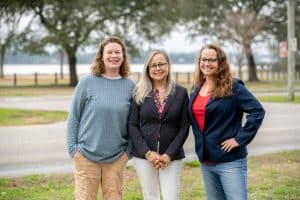News
CofC Faculty Partner with Trust for Public Land to Promote Access to Public Parks
The College of Charleston and the Trust for Public Land have teamed up to identify and promote high-impact policies that support equitable access to parks.
Morgan Hughey, assistant professor of health and human performance and Honors College faculty fellow, and Kendra Stewart, director of the College’s Joseph P. Riley Jr. Center for Livable Communities and professor of political science, with support from CofC students and graduate students, will work alongside the Trust for Public Land’s 10-Minute Walk Program to review park access policies in a sample of 25 U.S. cities. The project will identify efforts in cities such as Detroit, where leaders have implemented policies to convert vacant properties to parks or green spaces, and Seattle, where shared-use agreements allow the public to use outdoor school playgrounds outside of school hours. The assessment will include interviews with local government leaders and administrators to gain context, insight and expertise on the formulation, adoption and execution of policies that promote increased access to public parks.
Stewart and Hughey plan to develop a report outlining the various policies, as well as a road map of how other cities can work to increase access to parks in their communities using similar approaches.
“Our goal is to create a resource for cities to help them understand the different things they can do to increase access to parks – kind of a menu of options for policy solutions that cities can pick and choose from based on what’s best for their own neighborhoods,” says Stewart.
“Policy, funding and planning are key pieces of the puzzle when it comes to creating equitable park systems and thriving cities,” says Bianca Shulaker, 10-Minute Walk director and parks initiative lead. “The landscape of park policy is complex, and the prioritization of equity is relatively nascent in the field, so we hope tools like this menu of policy options will spur action to bring equitable park access to residents around the U.S.”
From a public health perspective, Hughey says access to parks supports better physical, mental and social health for residents, noting that it’s vital cities have the tools to make policy decisions that support the development of parks and green spaces.
But parks aren’t always equitably distributed within a community, something a 2021 report by the Trust for Public Land explored. According to the report, 100 million people in the U.S., including 28 million children, do not have access to a park or green space near their home. A 2020 report by the trust highlighted how residents in low-income neighborhoods and systemically under-resourced racial and ethnic minority communities have significantly less access to park space than residents of more affluent neighborhoods.
“We continue to see persistent health disparities across communities in the United States and know that the places that people live can be both contributors to and solutions for moving toward health equity,” says Hughey. “We know parks are beneficial for many dimensions for our overall health. It’s a win-win-win for people to have safe access to parks in their communities.”
The report, which is expected to be completed in the fall of 2023, will explore a range of policies that can meaningfully advance park access in local communities. The research team will publicly share findings to encourage and facilitate strategic and widespread adoption of policies to improve equitable park access by local leaders.

























